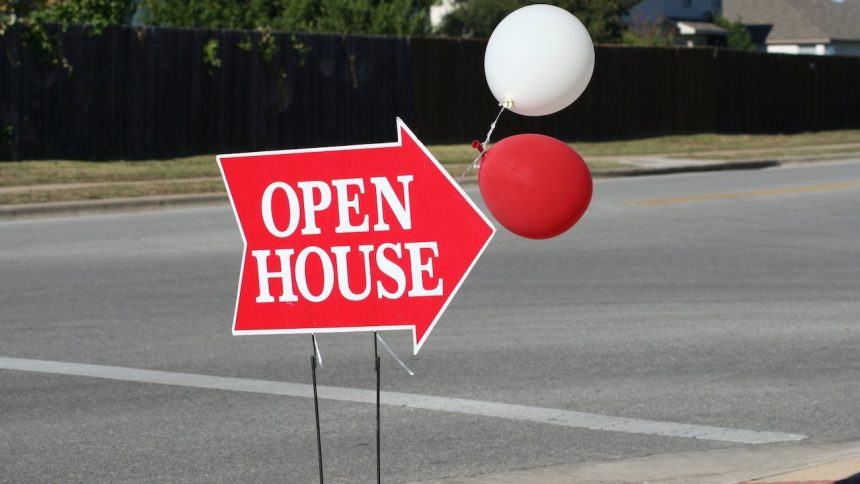The idea of an open house is to quickly get as many eyes as possible on a property that’s for sale. The listing agent hosts the event and shows the home to anyone who drops by, no appointment needed.
Preparing a home for an open house can be labor intensive, because you want it to really look its best. It may even require a little home staging (or a lot, depending on the home’s condition). But on the plus side, the home needs to be shined and polished only once for an open house, compared with multiple times for individual showings.
What is an open house?
During an open house, a seller’s real estate agent or broker holds open hours during which the home is available for the public to view. Potential buyers may drop by anytime within the scheduled hours, without an appointment. Most open houses are held on a Saturday or Sunday, to maximize the number of people that will be able to stop by without taking time out from work and other responsibilities.
Is it different from a ‘broker’s open house’?
Yes. As the name implies, a broker’s open house is specifically for other brokers, not for the general public. They involve the listing agent showing the home to other real estate agents, in the hopes that they will, in turn, want to show it to their clients.
How do open houses work?
When an agent hosts an open house, anyone interested in the home can stop in to take a peek. If you’re looking to buy a house, it’s an opportunity to look around and ask any questions you may have.
At an open house, house hunters can get a feel for the space and start to imagine themselves living there — serious shoppers might even bring an open house checklist to stay organized. If you’re interested, you can then arrange a time to go back and look at the home in greater detail.
These events tend to be casual in nature, and the listing agent will often provide refreshments and snacks, as well as informational flyers. This can lead to an almost party-like atmosphere at times, although COVID precautions have put a damper on that vibe. On the downside, it can also lead to looky-loos and curious neighbors who aren’t actually looking to buy.
Do they help a home sell?
An open house allows you to attract the attention of a larger pool of potential buyers — it helps get the house seen by as many people as possible. So you are expanding your network of potential buyers, which may ultimately lead to a faster sale. A higher exposure level equates to more potential buyers.
But just because more people see a home doesn’t automatically mean there will be more offers. An open house can be a crucial marketing opportunity, but it does not guarantee a sale.
A note about security
With a lot of strangers in and out of the house all at once, security can be a concern with open houses. This can be especially true in high-end neighborhoods that might be targets for thieves. It’s smart to take common-sense precautions before opening up your home to the public, including making sure all valuables are either locked away or out of the house. If you feel uneasy, be sure to discuss your concerns with your agent.
Pros and cons of holding an open house
Getting your home seen by plenty of potential buyers has obvious benefits. But crowds of strangers in the house can have drawbacks as well, particularly if the seller is still living there.
Pros
- Open houses are a great way to get your home in front of house hunters — the more, the better. More potential buyers means more potential offers. Ask your agent about their plans to follow up with serious prospects.
- They give buyers a chance to see the property at their leisure, without the hassle or commitment of scheduling a private showing. Open houses tend to be casual and less intimidating than formally scheduled appointments.
- They also allow interested shoppers to ask questions of the listing agent. If open house attendees like what they see and hear, they can then schedule a private showing to look more carefully.
- In addition, an open house for a brand-new listing helps the listing agent gauge interest in the property. Attendance, engagement and feedback can help the agent and seller decide whether the listing is likely to sell quickly, or whether they might need to consider a price reduction.
Cons
- Preparing for an open house, much like preparing to host a party, is a lot of work. They take time and energy to coordinate, and they require the home to look its very best: clean, tidy, clutter-free and, above all, welcoming.
- Unlike a party, however, the homeowner is typically not present during an open house. So finding a window of time when the entire family can clear out can present a scheduling challenge.
- Due to their casual, “drop on by” nature, they often attract the merely curious or nosy as well as people who are actually home shopping. A good agent can tell the difference.
- Most importantly, open houses are just that: open. People you don’t know will be wandering around your home while you’re not there. The listing agent keeps an eye on things, of course, but the more of a crowd there is the higher the chance that they might miss something. You don’t want to have any valuables, or breakables, in easy reach during the event. In fact, you may want to remove anything valuable from the home altogether.
How to find open houses
There are many ways to go about finding open houses near you, and it largely depends on how serious you are in your home search. If you’re just curious or in the very beginning stages of searching, looking online is probably your best bet. Numerous real estate sites offer open house information, and the events are often publicized on social media as well.
If you are in the throes of a serious house hunt, you’d be wise to enlist the help of a real estate agent who knows the local market well. They will have access to information and resources that you wouldn’t have on your own.
Are they only held on weekends?
Since the goal of an open house is to generate as much foot traffic as possible, they are typically held on Saturdays and Sundays, when most people are not at work. But they don’t have to be. You can often find open houses on weekday evenings, as well.
Do you need a Realtor to attend an open house?
No, you do not need a Realtor or any type of agent with you to attend an open house. However, if you are far enough along in your home search that you have retained one, it’s useful to have them with you — or at least fill them in that you’re attending. Agents can help you understand the features of the home, the neighborhood and the pricing. They can guide you through the process and offer professional expertise and insight based on their knowledge of the local market. They might even have insight about the previous sales history of a particular house.
Bottom line
When a home is put up for sale, the listing agent will often hold an open house to attract potential buyers and give them a chance to check it out. Open houses offer buyers a useful opportunity to see a variety of homes in their desired area without any pressure. They can create buzz around a listing and help it sell, but they are also challenging for the seller, who often still lives there.
Read the full article here
















